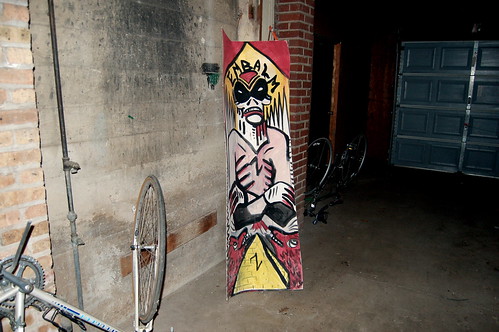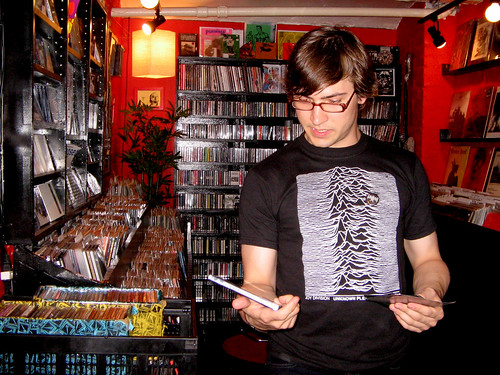[Y]ou'll find a stuffy basement hotbox packed to the ceiling with the most elusive items in the noise underground: cassettes affixed to shards of vinyl or slipped into fuzzy pouches, CD-Rs packaged in seven-inch sleeves, seven-inches packaged in tin foil, a record where the grooves are lathe-cut onto a coke mirror . . . everything from mutant monoliths like Merzbow and John Wiese to obscurants like Cream Corn Barf Extravaganza. There's plenty of black metal too, but no death metal, hardcore, or punk. "In many ways I would say it's a real punk store in that it's more about celebrating the individual instead of the genre," Fernow says. "Noise is the real punk. It's not about the haircut, it's not about politics, it's not about an agenda. It's personal. That's the key for me. And that's an intimacy."...Dom is the person who painted this...
Back in Madison, Wisconsin, when Fernow was in the eighth grade, some new friends invited him to hang out while their death/grind band practiced. The emotional intensity he witnessed was unlike anything he got from Aerosmith or the Chili Peppers. There were no gateway bands, no Metallica, no Slayer, not even Cannibal Corpse—Fernow just dove straight into tape-trading bands like Fleshgrind and Anal Blast. Around 1997, an appropriate distance from the time when computers and CD-Rs would become ubiquitous, 16-year-old Fernow started Hospital Records to release his home-recorded, organically made noise cassettes.

... which -- you may remember -- is something I couldn't get out of the garage, back when I cleared out the whole garage. It's an artifact of one of the concerts that were played in that garage. Embalm was a death metal band, and there were at least two other bands, Toy Gun and Four O'Clock Tragedy, that played here back then.
Anyway, John visited Dom in NYC this summer -- in that "stuffy basement hotbox" -- and got some great photos, like this one:





१६ टिप्पण्या:
I saw the post title and laughed at the confluence of my worlds - even the law blogs I read listen to noise (or, at least Ann's aware of it). Dave - I can't tell, do you miss the punk heyday or are you happy it's done with? and, um, I'm not sure I'd put Merzbow on the same list as Patti Smith. if there's any city in the world with a more vibrant noise scene, please let me know
ps - is lowercase-d dave confusing? ive occassionally messages the way i will here
- dave m.
most music culture is more about the 'scene' than it is about the actual music, i'll freely admit that (and complain about it). but isn't Dominick trying to avoid that posturing? it comes off a little bit preachy, maybe, but at least he's talking about a personal, intimate relationship with music as opposed to genre (and thus 'scene'). though i guess the packaging of lots of his material kind of damages my case...
dave M
Yeah, don't you like the part where he says it's not about politics?
Anyway, I certainly don't listen to noise myself. But the bands that played chez Althouse were really good, and Dom was interested in painting, which I studied long ago. Of course, I wish him well, and I'm happy to see him getting some recognition.
Patti Smith was never punk, she was/is a poseur hack.
Sid Vicious was punk of the sort that was instantly caricatured and commodified. How could it not be when he was a cration of Malcolm McLaren?
This guy's interests are "punk" in the sense that Chicago were "rock", that is to say punk in the most remote derivation.
Punk is not limited to CBGB's, safety pins and mohawks, or even a specific type of guitar-based rock. Punk is a type of attitude, a spirit not dissimilar to the original meaning of "beat". It encompasses a lot more than the cartoonish image and hipster posturing that so many are disdainful of.
New York has noise enough without intentionally making noise.
I'm looking to start a silence scene.
My silence band would be called The Pascals, and our concerts would consist of every band member and every audience member sitting alone, quietly, in small empty rooms for a couple of hours and then going home.
Palladian, your "scene" already exists. There are public (but quiet) meditation rooms all over New York City, and when things become too much for me, a quiet thirty to ninety minutes in one of those spaces feels like a week in the country.
If you think hip-hop is dead, you haven't been listening.
Oh, I've been listening, Danny. Listening for the final rattling breath (probably sampled from the final rattling breath of folk music) so I can gleefully sign the death certificate and arrange the funeral. Never has so much repetitive rythmic mediocrity, vulgarity and bad poetry been unleashed on human culture as since the advent of "hip hop".
It's hilarious listening to various factions of popular music afficianados argue about the validity and superiority of their particular flavors. Surprise! It's all garbage!
Do anyone still teach counterpoint?
Palladian, your critique of hip-hop resembles a Da Vinci Coder complaining about the state of modern fiction. A little bit of effort is required to find the good beneath the more ostentatious bad.
Danny, darling, I do not expend effort trying to find the diamond in the septic tank of "hip hop" entertainment, because the diamond, if ever found would, upon examination, be cubic zirconium anyway. Popular music generally doesn't interest me, especially if it has a beat and you can dance to it. I'm sure "hip hop", "noise", "punk" and other such things are appealing to persons of a certain age, and I'm sure some examples are more interesting than others. But it's all fundamentally musically and intellectually uninteresting to me, and any "effort" required to separate out the dross would reward me merely with the pinnacle of a form that I don't respect. So why bother?
the reason 'punk' and 'hiphop' have come to be blanket descriptive terms is not (just) that those scenes seek to appropriate all the good under their umbrella, but that those scenes are largely defined by a spirit of self-empowerment, which many people relate to as much as the music (or through the music, at least). Singing "I shot a man in Reno just to watch him die" to a crowd of felons is the kind of rebellious gesture that punk turns into a musical approach (even if the cheers on that record were added in post).
by now all this rebellion has been commodified and Iggy Pop songs sell cruise vacations to my parents, but i'd like to believe there's some authentic struggle for the self going on somewhere, whether or not it's at Hospital Records. by now CBs and most of downtown is a tourist attraction; there's a reason Sonic Youth has released a record called "Kill Yr Idols"
Palladian -
there's lots of popular music as complex and contrapuntal as anything from Art of the Fugue. no need to hear it if you don't want, though.
dave M (as was the last post)
I think one of the main things that turns me off of popular music is that it comes with a "lifestyle". When I listen to music I don't want a lifestyle, I want music. Many people are able to look past all that, but it's often inextricable for me. I don't think of music romantically (in terms of "empowerment" or "rebellion" or whatever), which seems to be what attracts people to a lot of music (popular and otherwise). In fact, the music sometimes seems an excuse for the lifestyle. Pop music, punk music, whatever, is often about a social scene, even if that scene is predicated on anti-social values; I'm fundamentally repelled by most social interaction. In music I seek solitude among other things.
Another thing I value in music is abstraction. Popular music is usually quite averse to abstraction, as is most vocal music (which is why I'm not a big opera fan, with the exception of a few composers like Purcell). Instead of a musical idea, popular music often promotes a social, political or romantic idea; again, the music is often superfluous.
A third thing I value is the ability of composed music to transcend a personality, an instrument, a time and place. Much pop music exists only as recorded music, and will, now and forever, be recorded music. The original source of "Happiness is a Warm Gun" is the recording on the White album, not a piece of sheet music. Sure, you can perform it all you want, but most likely you will be referencing the source, that specific recording by the Beatles, with its distinctive production, instrumentation, performance. You'll be performing that recording rather than that piece of music. This is a generalization, but I'm using it to make a point. While I love recorded music, and am especially fond of musicians who can make art out of the process of recording, there's something wonderfully unmatchable about a piece of written music that can transcend that specificity and be reborn again and again. Bach's Art of the Fugue is a great example of this: I have 6 recordings of the full piece and several recordings of separate contrapuncti, so if I want to listen to say the double fugue, number 9 of that work, I can choose between such diverse performances as Glenn Gould, the Emerson Quartet, The Swingle Singers, a saxophone quartet, a harpsichord, none particularly more authoratative than the others, each very different interpretations on that wonderfully rigorous fugue.
For the record, I do occasionally listen to "pop" music, and certainly did in my past. I was particularly fond of British "prog" rock like Gentle Giant and King Crimson, as well as bands that skirted the rock/prog line like Jethro Tull and Pink Floyd. I also liked all the "classic rock" stuff that I listened to from my relative's record collections stored in my grandparent's basement, like The Who and Zappa and the Mothers and the Beatles. I also confess to having both a Paula Abdul and a Debbie Gibson tape in the later 80s, both purchased on the advice of a junior high school friend who used to pretend, along with me, that we liked them for their looks. Of course, we both later came out of the closet.
Sippican: I don't think you can really say that Merzbow is trying to tell us everything sucks.
I suspect that actually he's just trying to destroy my speakers and/or eardrums.
And, mind you, I *like* his stuff.
टिप्पणी पोस्ट करा
Please use the comments forum to respond to the post. Don't fight with each other. Be substantive... or interesting... or funny. Comments should go up immediately... unless you're commenting on a post older than 2 days. Then you have to wait for us to moderate you through. It's also possible to get shunted into spam by the machine. We try to keep an eye on that and release the miscaught good stuff. We do delete some comments, but not for viewpoint... for bad faith.